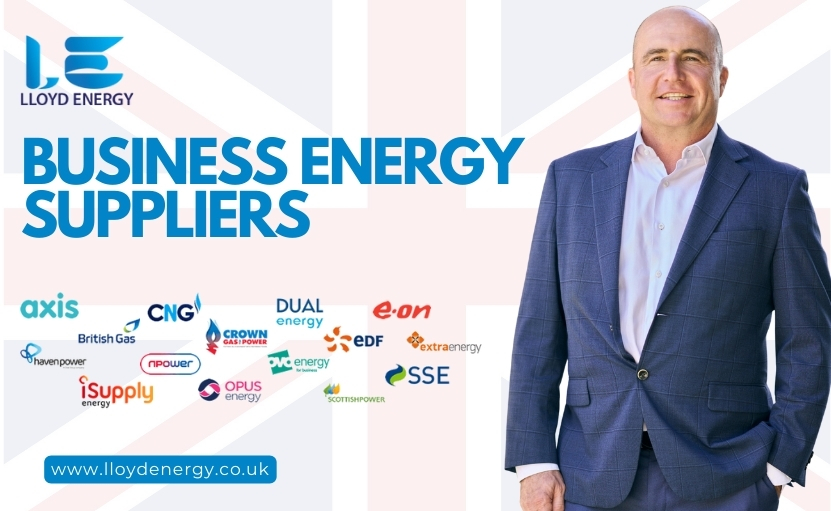Business Energy Suppliers


Guide to UK Business Energy Suppliers
One of the most important things to do when running a business is to keep costs down. Energy is one of the biggest costs. We can help you find a business gas supplier, compare business electricity prices, or figure out which energy supplier is best for catering. This guide will show you everything you need to know about UK business gas and electricity suppliers, such as how to compare business gas rates, save money, and make your energy choices easier.
Why It's Important to Choose the Right Business Energy Supplier
It's very important to pick the right energy supplier for your business so that you can keep your costs down. Business owners don't always realize how much money they can save just by switching suppliers. You can find a plan that works for you by comparing business gas and electricity suppliers. This is true whether you own a small café, a large office, or an industrial site.
When choosing an energy supplier for your business, there are a lot of things to think about:
1. Price: Naturally , companies want to get the best deals on electricity and gas.
2. Contract Flexibility: Some suppliers let you sign short-term contracts, while others let you sign long-term ones.
3. Customer Service: If something goes wrong, a supplier with great customer service can help you avoid problems.
4. Renewable Energy Options: If your business wants to go green, many suppliers have plans for green energy.
The Big 6 Energy Suppliers for Businesses in the UK
The Big 6 energy suppliers are the biggest players in the UK business energy market. They offer a wide range of competitive rates and dependable services to businesses that use energy. Here's a quick look at these suppliers:
| Supplier | Rating | Contract Length | Special Features |
|---|---|---|---|
| British Gas | ★★★★☆ | 12-36 months | 24/7 support, energy-efficient advice |
| EDF Energy | ★★★★☆ | 12-36 months | Competitive rates, renewable options |
| SSE Business Energy | ★★★★☆ | 12-36 months | Green energy, excellent customer service |
| ScottishPower | ★★★★☆ | 12-36 months | Low rates for large businesses |
| E.ON Energy | ★★★☆☆ | 12-24 months | Flexible contracts, reliable service |
| Npower Business | ★★★★☆ | 12-24 months | Easy online management tools |
The Big 6 suppliers offer some of the best business gas and electricity in the UK, but that doesn't mean they're always the best deal. To make sure you're getting the best deal, it's important to compare the prices of business gas and electricity.
Are you ready to look at the different energy options for your business?
In just a few minutes, you can compare business gas prices and business electricity rates from the best suppliers by clicking below.
How to Compare Energy Suppliers for Your Business
The first step to finding the best business energy supplier is to know what to look for. Here are some important things to think about when you compare business electricity suppliers:
1. Cost per kWh
The cost of energy per unit is one of the most important things. Make sure
you're comparing business gas and electricity rates that are best for how much
your business uses them.
2. Length and Terms of the Contract
Most energy contracts last between 12 and 36 months. You need to find one that
fits your budget and your business needs.
3. Fees and Penalties for Leaving
If you decide to switch suppliers early, always read the fine print to see if
there are any exit fees or penalties.
4. Plans for Renewable Energy
More and more businesses are switching to clean energy. Some suppliers have
plans where all the energy comes from renewable sources. This could be very
important for your goals of being more environmentally friendly.
How to Find the Best Prices on Business Gas
Comparing prices is an important step if you want to find the best business gas supplier. Here are some useful tips for comparing the business gas prices:
-
Use websites that let you compare: You can easily compare prices from many suppliers on websites like Compare Business Gas with just a few clicks.
-
Check usage: Knowing how much gas you use can help you get more accurate quotes.
-
Read customer reviews: Looking into what customers have said about their experiences can help you understand how reliable a service is.
Which energy company is best for catering?
If you run a catering business, your energy needs can change a lot depending on the time of year and the size of the events. To get the best rates, think about these things:
-
Energy-intensive equipment: Catering businesses often have big ovens, refrigerators, and stoves. Finding an energy supplier who can give you good business electricity prices is very important.
-
Flexible contract terms: Some catering companies may want short-term contracts because their work is seasonal.
-
Green options: If your brand is about being eco-friendly, you might want to choose a supplier that uses renewable energy.
Are you ready to lower your business energy bills?
Today, compare business gas and electricity suppliers to see how much you can save!
How to Cut Your Business's Energy Costs
You can lower your business energy bills in a number of ways, such as:
1. Switching suppliers: As we said before, one of the easiest ways to save money is to regularly compare business gas and electricity suppliers.
2. Energy-efficient equipment: To use less energy, think about getting new equipment that uses less energy.
3. Energy-saving practices: Ask your employees to turn off lights, tools, and appliances when they aren't using them.
Start Saving on Your Business Energy Bills Today
We help business owners find the best deals on business gas and electricity, which saves them time, money, and stress. You can lower your business's energy bills and cut down on unnecessary overhead costs by comparing rates and picking the best supplier.
Don't wait for the next big energy bill. Right now, compare business gas prices or business electricity suppliers to get the best deal!
To compare business electricity providers, first figure out how much energy you use. To find the best deals for your needs, use comparison websites or talk to an expert.
The best energy supplier for a big business depends on what you need. British Gas and SSE are two suppliers that often offer bulk energy solutions at competitive prices for big businesses.
Yes, it's easy to switch your business's gas and electricity providers, and you could save a lot of money. You usually have to give notice on your current contract before you can switch.
When choosing a business gas supplier, think about things like the price per kWh, the terms of the contract, the quality of customer service, and whether the supplier offers any energy-saving tips or green energy plans. You can find the best deal by comparing business gas prices on a regular basis.
Yes, a lot of suppliers now offer green energy plans for businesses. These plans get their energy from sources that can be used again and again. This is very important if your business is focused on being environmentally friendly or if you want to improve your corporate social responsibility (CSR) profile.
It usually takes 15 to 30 days to switch your business's gas and electricity provider, depending on your current provider and contract. During this time, your service won't be interrupted, and you can keep using energy as usual while the switch is being processed.

